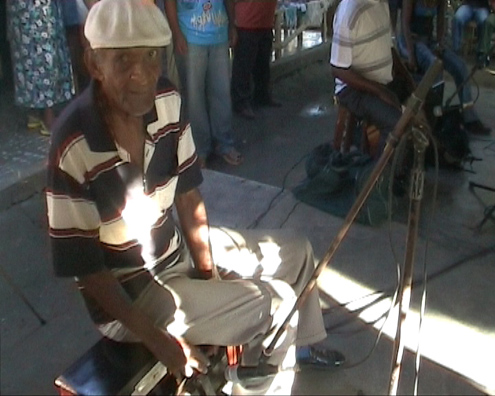Lo Nuevo[hide]
Musicos: Dennis Nicles Cobas
Fotos: Eli Silva
Grupos: Ritmo Oriental : 1988 - Vol. IX - 30 a...
Musicos: Rafael Paseiro Monzón
Musicos: Jiovanni Cofiño Sánchez
Fotos: Tom Ehrlich : 2024 Monterey Jazz, P...
Resenas: Vacilón Santiaguero (Circle 9 ...
Staff: Bill Tilford
Fotos: Tom Ehrlich : 2024 Monterey Jazz, P...
Fotos: Tom Ehrlich : 2024 Monterey Jazz Fe...
Fotos: Tom Ehrlich : testing 123
Grupos: Pupy y los que S... : Discography - 1995- F...
Reportes: From The St... : Cubadisco 2...
Reportes: From The St... : Jazz Plaza ...
Fotos Del Día [hide]
SpanishEnglishJosé "Nino" Olivares Pérez

instrumento: marimbula
grupos: Changüí de Guantánamo, El Siboney, Septeto Jóvenes del Guaso
grabaciones: Changüí de Guantánamo: "Bongó de Monte" , Changüí de Guantánamo: "Changüí y Cumbancha, ahora sí"
El fallecido Nino Olivares, también conocido como Nino Marimba, era una de las caras más conocido en el mundo del changüí empezando a tocar marimbula con Changüí de Guantánamo desde el 1960, casi 50 años. Siendo nueva en el changüí yo solo lo encontré en algunas ocasiones:el Festival Nacional del Changüí Festival en Guantánamo, un changüí verdadero en Casa de Pipi en Yateras y últimamente en Paris donde tuve la opportunidad grabar una breve entrevista con él. Aunque lo apena conocí, con su fallecimiento siento un gran pérdida. Para mí Nino Olivares era el representante perfecta de que es un changüisero. Por no presumir de elogiarlo con lo poco que sé de él, dejaré que habla el mismísimo Nino para que otras personas pueden conocerlo, si tan solo un poquito. Abajo hay una transcripcion de la entrevista que le hice en el camarino en Paris. Para ver el video de la entrevista pon clic aquí o en la foto abajo. [Michelle White enero 2010]
[Michelle White enero 2010]
"A tocar...bueno si te digo yo empecé a tocar de cuando yo tenia por lo menos 21 años, 21 años. No tocaba changüí, tocaba el septeto cuando el septeto se usaba marimba. No había bajo y cuando en ese tiempo después vino contrabajo y vino pepepe ...Pero en la decada que yo empecé a tocar, yo empecé a tocar marimba como si fuera un septeto [son], como que le llamaban aquella vez. Y después pasaron los años se acabó aquello del septeto, me casé empecé a luchar mi vida. Y después empecé a tocar. Venía de allá de mi trabajo, de la colonia donde sea, los sábados y domingos me pasaba los días esos metido en los changüí que se daban en el norte, mi barrio. Allí empezaba viernes, sábado y domingo y a veces se terminaba el lunes. Allí se vendía ron, ponche bacalao frito, to’ se vendía en esos tiempos. Y después pasaron muchos años, muchos años así seguí mi trabajo antes de lo hermanos Latamblet: Chito, Arturo Latamblet, el nombrado Tambrón. El dijo “Bueno estamos buscando un marimbero pa’ que toque" Cuando eso yo trabajaba en la construcción. Le dije “Mira yo no puedo dejar la construcción porque yo tengo mi salario y no puedo.” Dice, “Mira, esta noche ahí es noche de Guaso en el parque.” Digo “Nino, yo quisiera que tú fuera, tú fuera”. Digo, “Voy hacer toda la manera de ir". Cuando eso cultura estaba al frente el parque. Había que quitarme, por, quitarme mi ropa que yo llevaba. Me ponía un pantaloncito negro de’sos y una guayaberita de’sas y iba hacer mi noche guaso. Cuando yo terminaba tenía que rindar el pantaloncito y la guayabera. Y ahí seguí y me empezaron a pagar a cinco pesos por la actividad que yo hiciera. Y seguí machucando, machucando mi trabajo y machucando el changüí con los...con Chito Latamblet y con el que te dije. Y digo bueno, y a veces cuando vino el presidente de la guará, que tengo que tener, dejar el micom, o entrar, am, coji y le di, mira mira me voy a quedar con el Changuí…. Y hasta pa’ca fui. Hasta ahora hasta ahí."
José Nino Olivares Pérez - el 5 de septiembre 2008 París, Francia
Nino en un changüí en Casa de Pipi en Yateras, el 21 de diciembre 2007



















